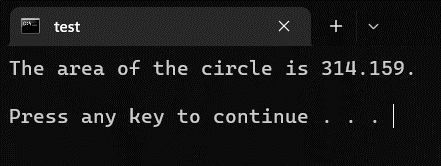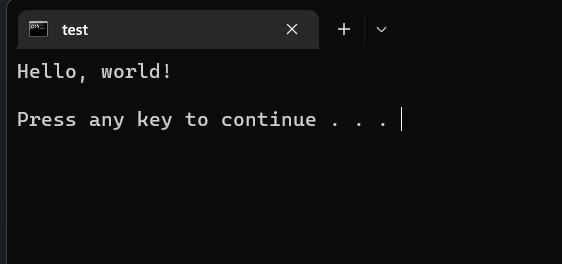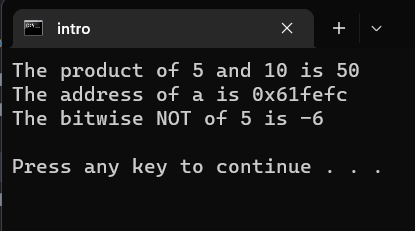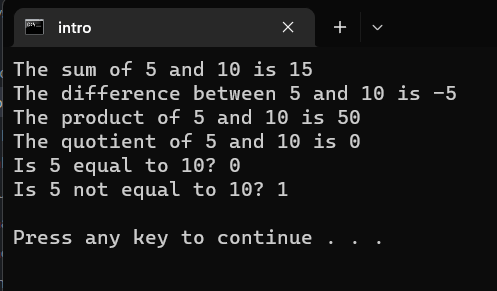What is a Token in C++What is a token?A C++ program is composed of tokens which are the smallest individual unit. Tokens can be one of several things, including keywords, identifiers, constants, operators, or punctuation marks. There are 6 types of tokens in c++:
1. Keywords:In C++, keywords are reserved words that have a specific meaning in the language and cannot be used as identifiers. Keywords are an essential part of the C++ language and are used to perform specific tasks or operations. There are 95 keywords in c++:
If you try to use a reserved keyword as an identifier, the compiler will produce an error because it will not know what to do with the keyword. Here is an example of a program that tries to use a reserved keyword as an identifier: Output: 
Explanation: When we compile the above code, the compiler will produce an error. This error occurs because the int keyword cannot be used as an identifier. It would help if you chose a different name for your variable to avoid this error. In summary, reserved keywords are an essential part of the C++ language and cannot be used as identifiers. You must choose a different name for your variables, functions, and other objects in your code. 2. IdentifiersIn C++, an identifier is a name given to a variable, function, or another object in the code. Identifiers are used to refer to these entities in the program, and they can consist of letters, digits, and underscores. However, some rules must be followed when choosing an identifier:
Here are some examples of valid and invalid identifiers in C++:
It's important to choose meaningful and descriptive names for your identifiers to make your code easier to read and understand. Example: Output: 
Explanation: In this program, the variable's age and name are identifiers used to store and access the values of the variables. The identifier age is used to store a person's age, and the identifier name is used to store the person's name. Notice how the identifiers are chosen to be descriptive and meaningful, which makes the code easier to read and understand. You can use any valid identifier in your C++ programs if you follow the rules for naming identifiers discussed earlier. 3. ConstantsIn C++, a constant is a value that cannot be changed during the execution of the program. Constants often represent fixed values used frequently in the code, such as the value of pi or the maximum size of an array. To define a constant in C++, you use the const keyword followed by the data type and the constant's name and then initialize it with a value. The value of a constant cannot be changed once it has been defined. Here is an example: In this example, the constant PI is of type double and is initialized with the value of pi. You can then use the constant PI in your code wherever you need to use the value of pi. Using constants instead of regular variables is important when you need to represent fixed values in your code. This can make your code more readable and maintainable and prevent accidental changes to the value of the constant. Example: Output: 
Explanation: In this program, the constant PI is used to represent the value of pi. The value of PI is defined using the const keyword and is initialized with the value of pi. The constant PI is then used in calculating the area of a circle, which is multiplied by the radius of the circle squared to determine the area. Notice how the constant PI is used the same way as a regular variable, but it cannot be changed once it has been defined. This makes it a perfect choice for representing fixed values used frequently in the code. You can use constants in your C++ programs to represent fixed values that cannot be changed. This can make your code more readable and maintainable and prevent accidental changes to the value of the constant. 4. String:In C++, a string is a sequence of characters that represents text. Strings are commonly used in C++ programs to store and manipulate text data. To use strings in C++, you must include the <string> header file at the beginning of your program. This will provide access to the string class, which is used to create and manipulate strings in C++. Here is an example: Output: 
Explanation: In this example, the string class creates a string variable named message. The message variable is initialized with the string "Hello, world!" and then printed to the screen using the cout object. You can use the string class to perform various operations on strings, such as concatenating strings, comparing strings, searching for substrings, and more. For more information, you can consult the documentation for the string class. 5. Special symbols:In C++, several special symbols are used for various purposes. The ampersand (&) is used to represent the address of a variable, while the tilde (~) is used to represent the bitwise NOT operator. Some of the most common special symbols include the asterisk (*), used as the multiplication and pointer operators. The pound sign (#) is used to represent the preprocessor directive, a special type of instruction processed by the preprocessor before the code is compiled. The percent sign (%) is used as the modulus operator, which is used to find the remainder when one number is divided by another. The vertical bar (|) is used to represent the bitwise OR operator, while the caret (^) is used to represent the bitwise XOR operator. The exclamation point (!) is used to represent the logical NOT operator, which is used to negate a Boolean value. In addition to these symbols, C++ also has a number of other special characters that are used for a variety of purposes. For example, the backslash (/) is used to escape special characters, the double quotes (") are used to enclose string literals, and the single quotes (') are used to enclose character literals. Overall, the special symbols in C++ are an important part of the language and are used in a variety of different contexts to perform a wide range of operations. Example: Output: 
Explanation: In this program, the asterisk (*) is used as the multiplication operator to calculate the product of two variables, a and b. The ampersand (&) is used to get the address of the a variable, which is then printed to the console. Finally, the tilde (~) is used as the bitwise NOT operator to negate the value of a. 6. Operators:In C++, operators are special symbols that are used to perform operations on one or more operands. An operand is a value on which an operator acts. C++ has a wide range of operators, including arithmetic operators, relational operators, logical operators, and others. Arithmetic operators are used to perform mathematical operations such as addition, subtraction, multiplication, and division. Some examples of arithmetic operators include + (used for addition), - (used for subtraction), * (used for multiplication), and / (used for division). Relational operators are used to compare two values and determine their relationship. Some examples of relational operators include == (used to check for equality), != (used to check for inequality), > (used to check if a value is greater than another), and < (used to check if a value is less than another). Logical operators are used to combine two or more relational expressions and determine their logical relationship. Some examples of logical operators include && (used for the logical AND operation), || (used for the logical OR operation), and ! (used for the logical NOT operation). In addition to these operators, C++ also has a number of other operators that are used for different purposes. For example, the bitwise operators are used to perform bitwise operations on individual bits of a value, and the assignment operators are used to assign a value to a variable. Overall, operators are an essential part of C++ and are used to perform a wide range of operations in a program. Example: Output: 
Explanation: In this program, various operators are used to perform different operations. The + operator is used for addition, the - operator is used for subtraction, the * operator is used for multiplication, and the / operator is used for division. The == and != operators are used to check for equality and inequality, respectively.
Next TopicWhat is include iostream in C++
|
 For Videos Join Our Youtube Channel: Join Now
For Videos Join Our Youtube Channel: Join Now
Feedback
- Send your Feedback to [email protected]
Help Others, Please Share









